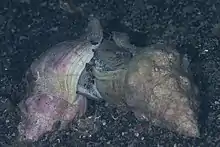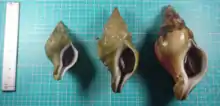Kelletia lischkei
Kelletia lischkei is a species of large sea snail, or whelk, a marine gastropod mollusc in the family Buccinidae, the true whelks.
| Kelletia lischkei | |
|---|---|
 | |
| Two live Kelletia lischkei snails | |
| Scientific classification | |
| Kingdom: | |
| Phylum: | |
| Class: | |
| (unranked): | |
| Superfamily: | |
| Family: | |
| Genus: | |
| Species: | K. lischkei |
| Binomial name | |
| Kelletia lischkei (Oyama, K., 1951) | |
Description

Three Kelletia lischkei snails
Kelletia lischkei is a medium-to-large species of buccinid whelk.[1][2]
Distribution
The species is endemic to the Sea of Japan, and is found in coastal waters off of South Korea[3] and eastern Japan.[1] Fossils of K. lischkei occur in the Middle Pleistocene fossil record of Japan,[4] and the species bears a resemblance to the extinct fossil species Kelletia brevis.[5]
References
- Hayashi, Seiji (2005). "The molecular phylogeny of the Buccinidae (Caenogastropoda: Neogastropoda) as inferred from the complete mitochondrial 16s rRNA gene sequences of selected representatives". Molluscan Research. 25: 85–98.
- Vaux, Felix; Hills, Simon F.K.; Marshall, Bruce A.; Trewick, Steven A.; Morgan-Richards, Mary (2017). "A phylogeny of Southern Hemisphere whelks (Gastropoda: Buccinulidae) and concordance with the fossil record". Molecular Phylogenetics and Evolution. 114 (2017): 367–381. doi:10.1016/j.ympev.2017.06.018. PMID 28669812.
- Hwang, H.; Kang, J.; Cho, I.; Kang, D.; Paek, W.K.; Lee, S.H. (2014). "Benthic invertebrate fauna in the islets of Namuseom and Bukhyeongjeseom off Busan". Journal of Asia-Pacific Biodiversity. 7: e206–e212. doi:10.1016/j.japb.2014.03.009.
- Ogasawara, K. 2002. Cenozoic Gastropoda. In: Ikeya, N., Hirano, H., Ogasawara, K. eds. The database of Japanese fossil type specimens described during the 20th Century (Part 2). Palaeontological Society of Japan, Special Paper 40. University of Tokyo, Tokyo.
- Ozaki, H (1954). "On the palaeontology of the basal conglommerate of Pliocene Tyoshi City, Kanto Region". Bulletin of the National Science Museum, Tokyo. 34: 9–21.
This article is issued from Wikipedia. The text is licensed under Creative Commons - Attribution - Sharealike. Additional terms may apply for the media files.